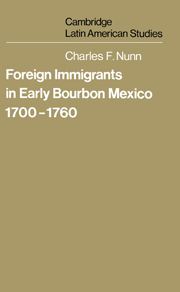Book contents
- Frontmatter
- Contents
- List of tables and figures
- Acknowledgements
- Viceroys of New Spain, 1688–1766
- Map of the viceroyalty of New Spain in 1740
- Introduction
- 1 Spies, interlopers, and the famous foreign merchant
- 2 Entering the viceroyalty: immigrants by accident and by design
- 3 Religion: the essential requirement
- 4 Other hurdles to acceptance
- 5 The burden of wealth
- Conclusion
- Appendices
- A note on names
- I A partial list of foreigners in New Spain, 1700–1760
- II Jesuit foreigners in New Spain, 1700–1760
- List of abbreviations and conventions
- Notes
- Bibliography
- Index
- Frontmatter
- Contents
- List of tables and figures
- Acknowledgements
- Viceroys of New Spain, 1688–1766
- Map of the viceroyalty of New Spain in 1740
- Introduction
- 1 Spies, interlopers, and the famous foreign merchant
- 2 Entering the viceroyalty: immigrants by accident and by design
- 3 Religion: the essential requirement
- 4 Other hurdles to acceptance
- 5 The burden of wealth
- Conclusion
- Appendices
- A note on names
- I A partial list of foreigners in New Spain, 1700–1760
- II Jesuit foreigners in New Spain, 1700–1760
- List of abbreviations and conventions
- Notes
- Bibliography
- Index
Summary
De-Hispanizing foreign names is a tricky, uncertain, but necessary procedure. Modern spellings for given names are preferred almost universally in the following appendices and are based on various dictionaries of non-English to English. For example, the modern Portuguese ‘Manuel’ is used rather than the archaic ‘Manoel’. One should approach dictionaries with caution, however, as the case of ‘Jacob’ illustrates. The name came into Latin from Greek as ‘Iacobus’. The French and the English transformed this to ‘Jacob’ and split off ‘Jacques’ and ‘James’, respectively, as separate names. The Germans adopted ‘Jakobus’, now shortened to ‘Jakob’. The Spaniards and the Florentines, beginning with the Latin ablative, used ‘Jacobo’. Variations in Spanish include ‘Diego’, ‘Santiago’, and ‘Jácome’. Evolution in Italian produced the dialectal ‘Giacob’ which most modern Italians now render as ’Giacomo’, the same name they use for ‘James’. The ‘Giacobbe’ of the dictionaries is a throwback to Hebrew, and Italians use this form almost exclusively in reference to the Bible. Generally, the appendices employ modern spellings for given names, except when there is no danger of confusion, as in using the Irish ‘Denis’ rather than the English ‘Dennis’. For Savoyards, Bohemians, and certain others from areas of mixed linguistic heritage, the form of the given name chosen as ‘best’ depended on the probable ethnic classification of the surname. Occasionally it was necessary to move beyond dictionaries to national histories and similar works in order to locate the proper spelling for a particularly unusual given name.
- Type
- Chapter
- Information
- Foreign Immigrants in Early Bourbon Mexico, 1700–1760 , pp. 119 - 120Publisher: Cambridge University PressPrint publication year: 1979
- 1
- Cited by



